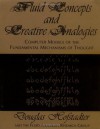251
Followers
4
Following
Manny Rayner's book reviews
I love reviewing books - have been doing it at Goodreads, but considering moving here.
Currently reading
The Greatest Show On Earth: The Evidence For Evolution
R in Action
Fluid Concepts and Creative Analogies
McGee on Food and Cooking: An Encyclopedia of Kitchen Science, History and Culture
Epistemic Dimensions of Personhood
Pattern Recognition and Machine Learning (Information Science and Statistics)
Relativity, Thermodynamics and Cosmology
The Cambridge Handbook of Second Language Acquisition
 On Monday, an old friend came round to lunch, and, while we were having a cup of tea in the living room, remarked on the number of Richard Dawkins books on my shelf. Somehow, I'd never heard that she'd actually had Dawkins as a supervisor for one term when she was an undergraduate at Oxford in the late 70s; it was in connection with the course she was reading on animal behaviour. I asked what he was like as a person, and she was unenthusiastic. Clearly very intelligent, but there was something about him that she found disquieting. She wouldn't go so far as to say that he'd behaved inappropriately, there was never a specific incident she could point to, but she constantly felt that he was just an inch from the line. Well... charismatic, thirty-something male supervisor, attractive young female undergraduate, animal behaviour, you can see plenty of scope for that. And she said that, even then, he'd go on about religion. After a while, she became increasingly sure that his hostile feelings were rooted in some kind of personal disappointment he'd suffered, though she had no idea what it might have been.
On Monday, an old friend came round to lunch, and, while we were having a cup of tea in the living room, remarked on the number of Richard Dawkins books on my shelf. Somehow, I'd never heard that she'd actually had Dawkins as a supervisor for one term when she was an undergraduate at Oxford in the late 70s; it was in connection with the course she was reading on animal behaviour. I asked what he was like as a person, and she was unenthusiastic. Clearly very intelligent, but there was something about him that she found disquieting. She wouldn't go so far as to say that he'd behaved inappropriately, there was never a specific incident she could point to, but she constantly felt that he was just an inch from the line. Well... charismatic, thirty-something male supervisor, attractive young female undergraduate, animal behaviour, you can see plenty of scope for that. And she said that, even then, he'd go on about religion. After a while, she became increasingly sure that his hostile feelings were rooted in some kind of personal disappointment he'd suffered, though she had no idea what it might have been.I asked her which Dawkins she'd read, and, like most people, it was The Selfish Gene and The God Delusion. She hadn't particularly liked either one. I can sympathize with her point of view. But, as other reviewers here have said, Dawkins is a more complex person than he's generally given credit for, and if you read The Ancestor's Tale you'll see another side. I suppose one could say that he's attacking religion here too, but the strategy is completely the opposite of the blunt, in-your-face assault he uses in the The God Delusion; to my mind, it's also far more effective. Rather than tell you what's ugly and wrong about Intelligent Design, he concentrates his energies on showing you what's beautiful and right about evolution, and how, far from contradicting traditional religious beliefs, it reveals them with a clarity that previous generations have been unable to see.
I kept thinking of Saint Francis of Assisi, and his love of all living creatures. "Brother bird, sister ant"... they're beautiful poetic phrases. But what do they mean? Evidently, this finch can't literally be my brother. There is no way that my mother could have given birth to him. The conventional explanation is that we're both "children of God", which is fine as far as it goes; the problem is that it doesn't really shed much light on the nature of our relationship. The astonishing thing about evolution, which forms the core of this book, is that it shows how the bird and ant truly are my brother and sister. Well, not quite brother and sister - in fact, they're very distant cousins. Dawkins traces the family tree, and shows precisely how we're all related. He starts with the obvious cases (apes, monkeys), then goes back to other mammals, and then further through reptiles, birds, amphibians, insects, sponges, plants and all the way to protozoa. On the way, he tells you some extraordinary stories. Well, that shouldn't be a surprise; think what interesting stories you hear when you meet up with a friend you used to know well, but haven't seen for a decade. Here, you are in some cases meeting up with people you haven't seen for several hundred million years.
At the end, I felt, as I had never felt before, how we're all one family in the plain, everyday sense of the word, and how we're linked though the genes we share, which we've inherited from our common ancestors. It's a truly incredible thought. As Dawkins says on the last page: it's not so much that he disagrees with religious people, it's more that they're saying it the wrong way. If you are yourself a religious person who wants to learn to be closer to God and His Creation, you could do worse than read this book.











